
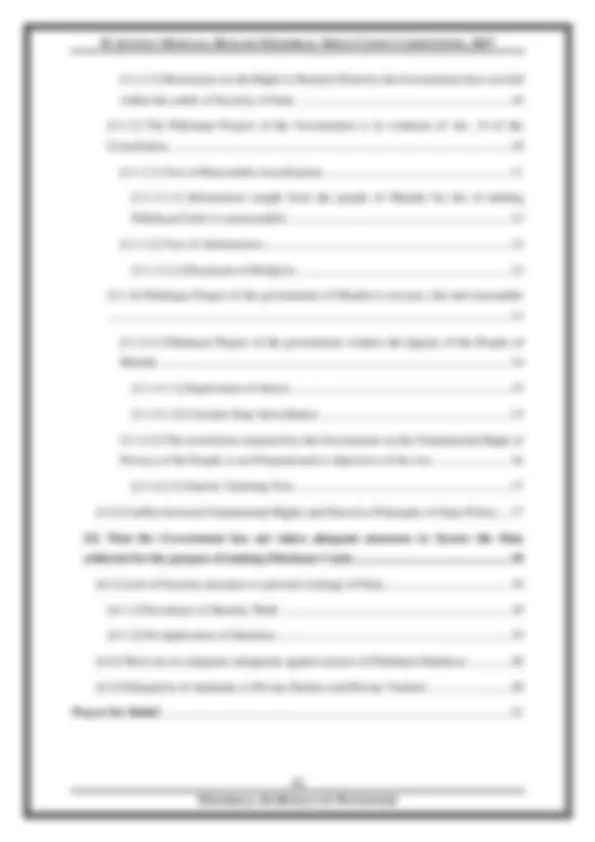
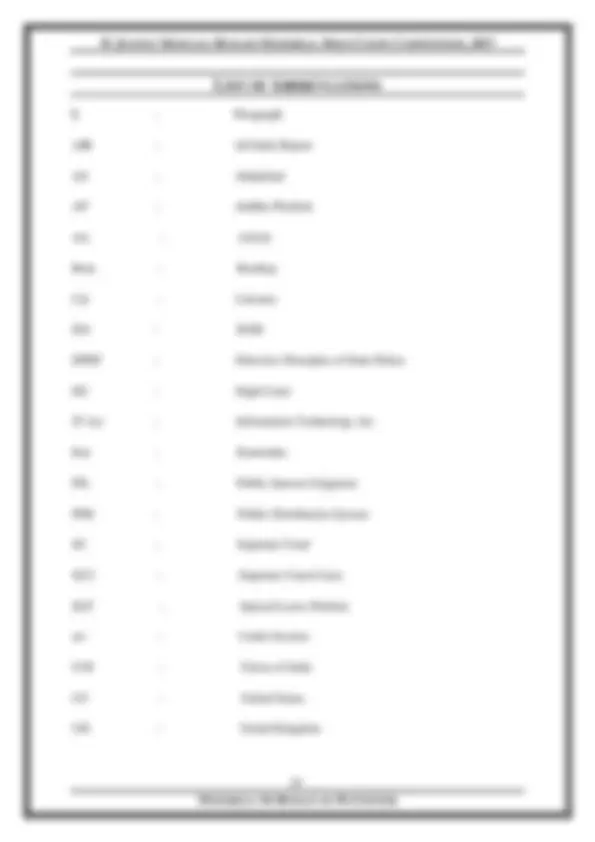
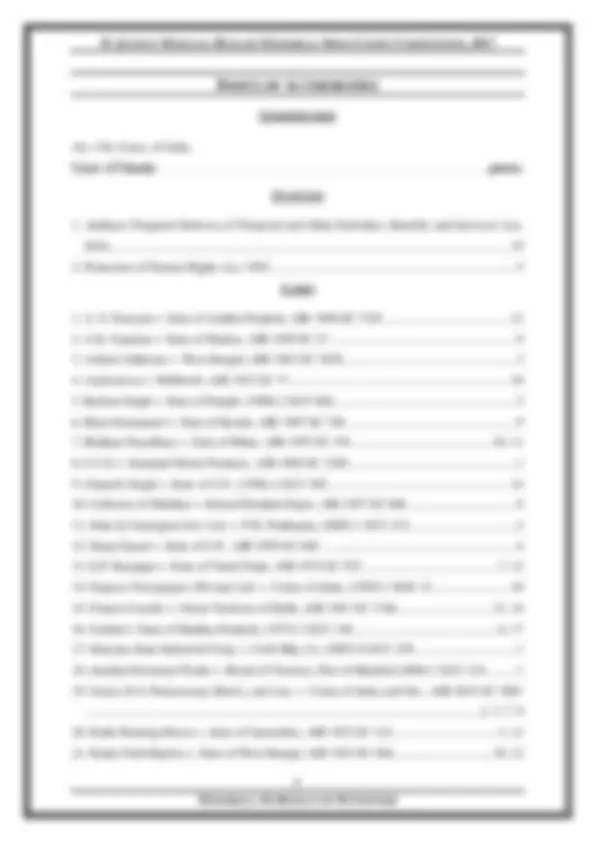
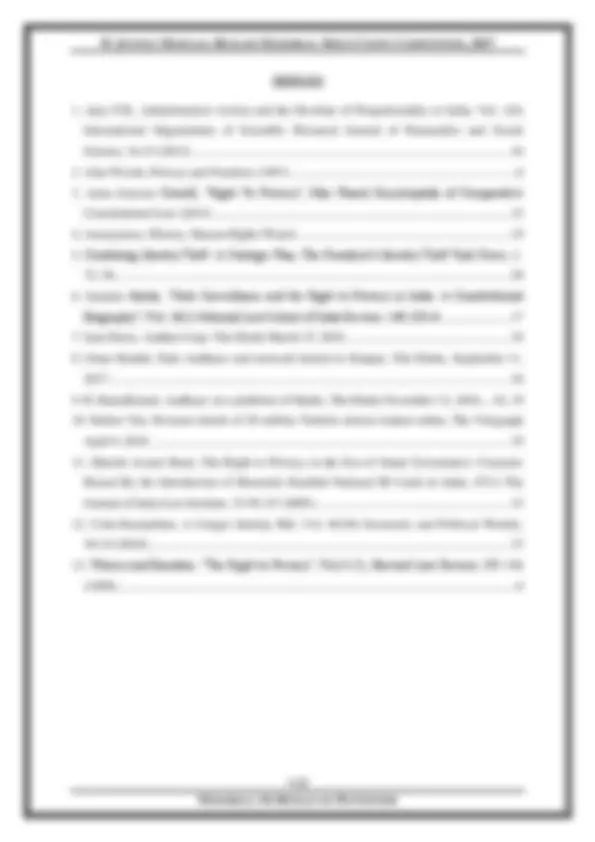

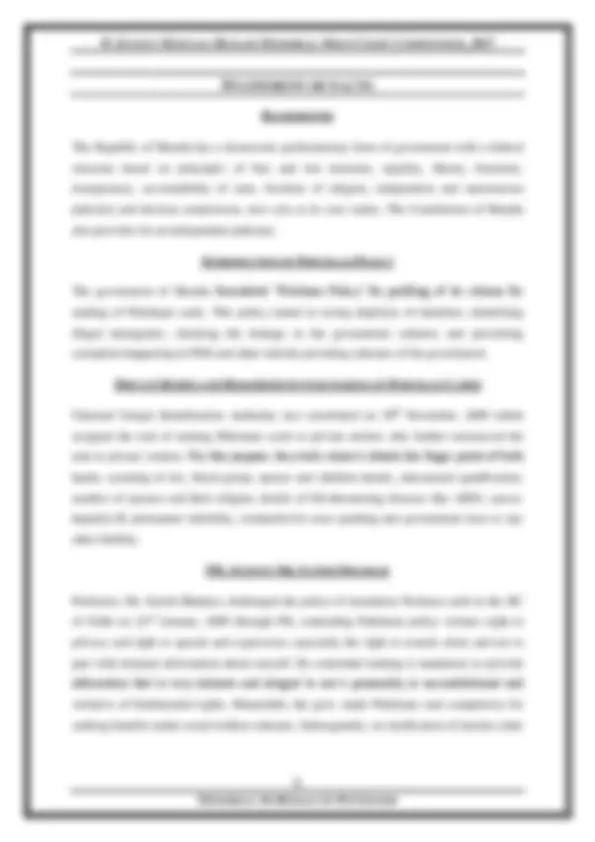
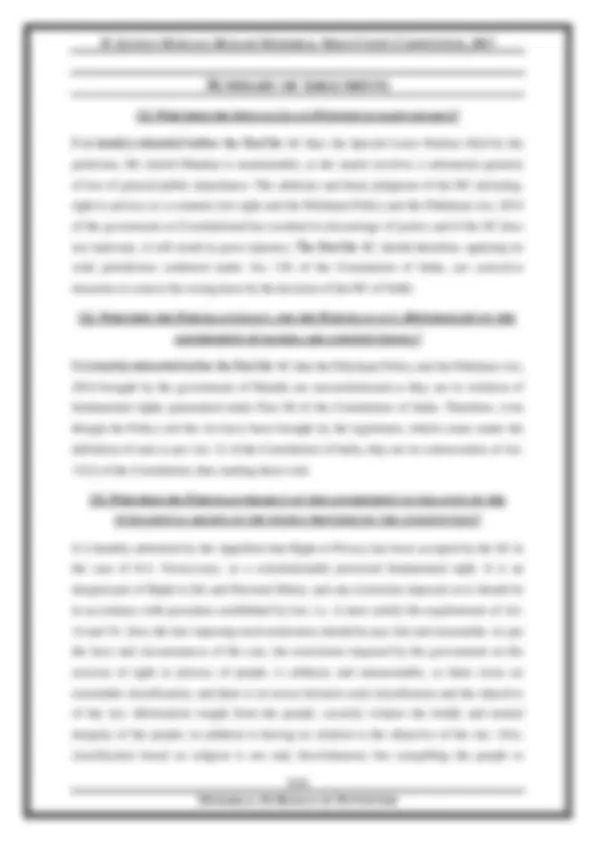
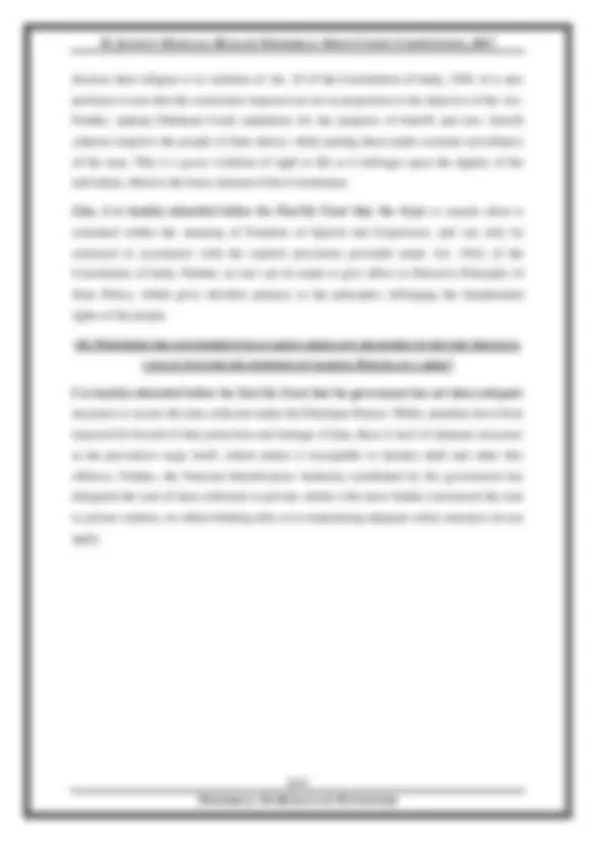
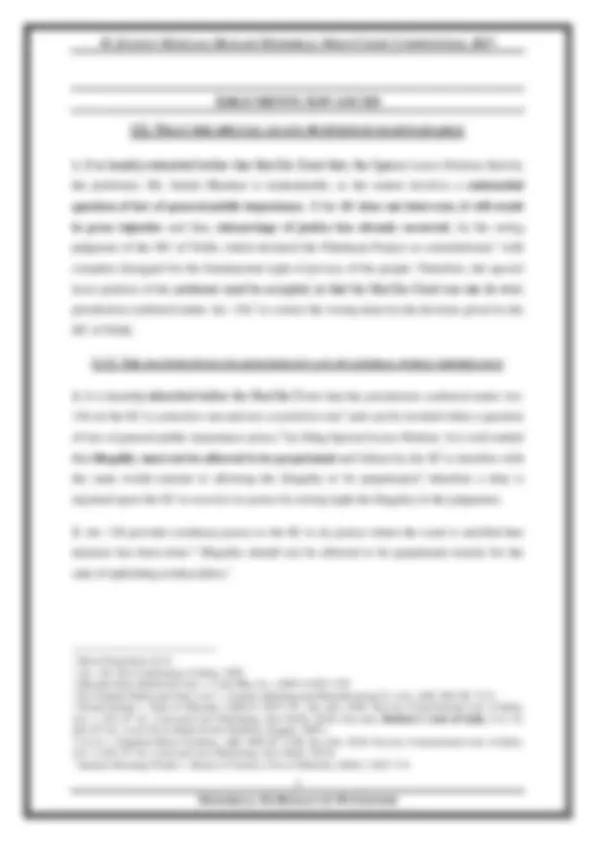
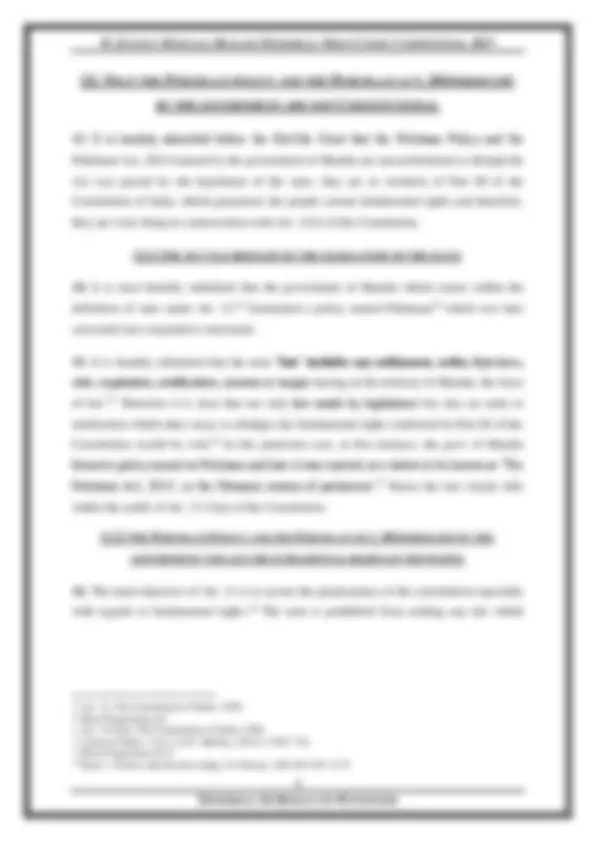
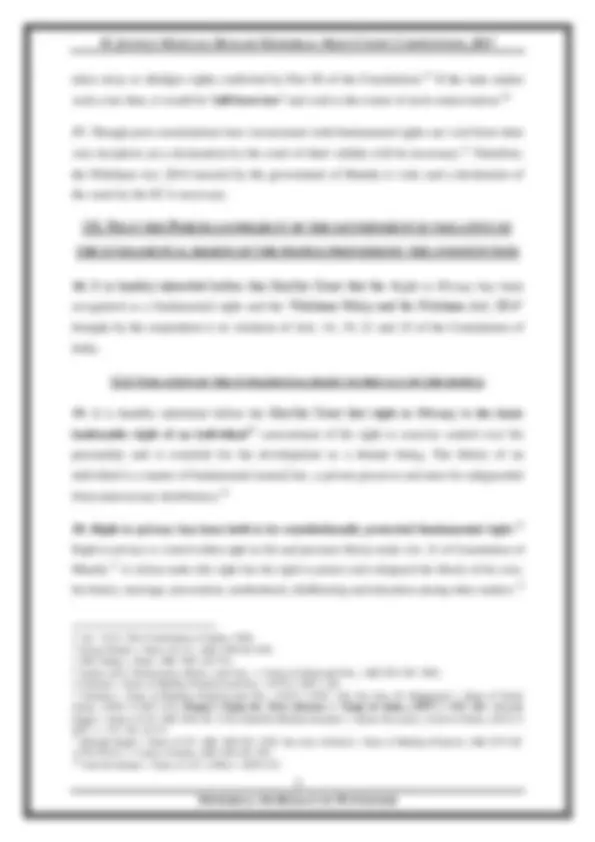
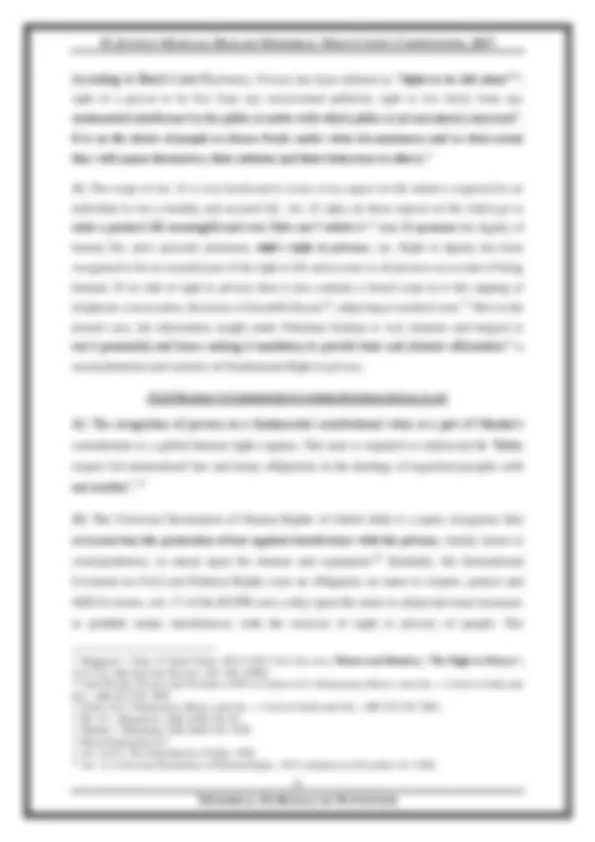
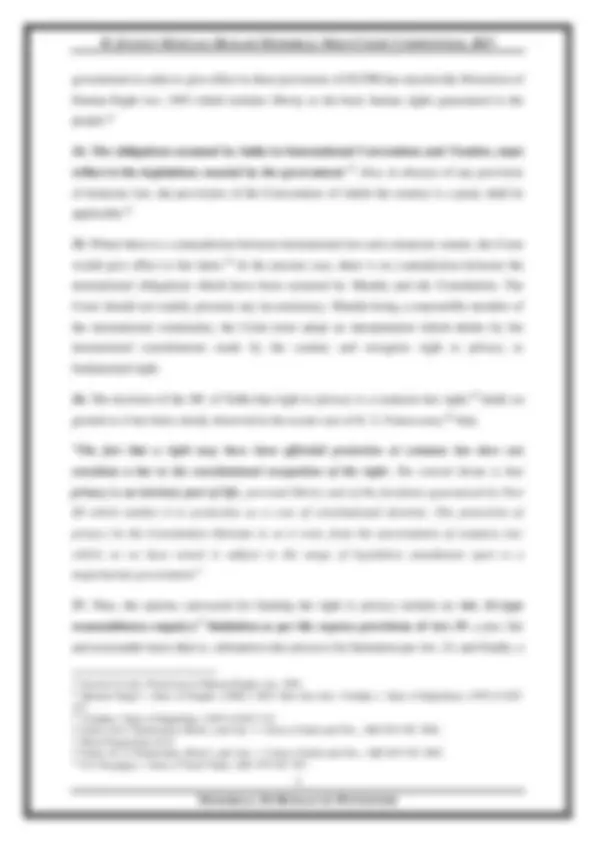
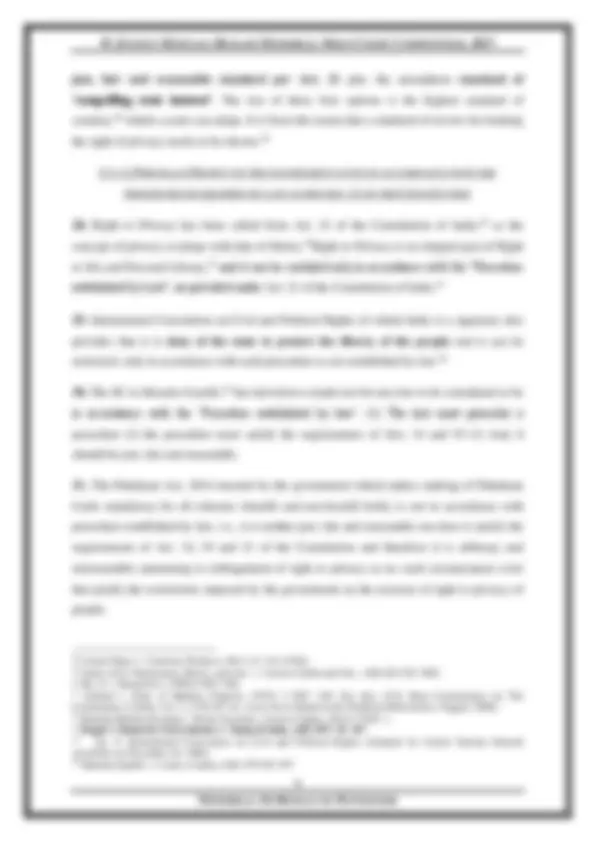
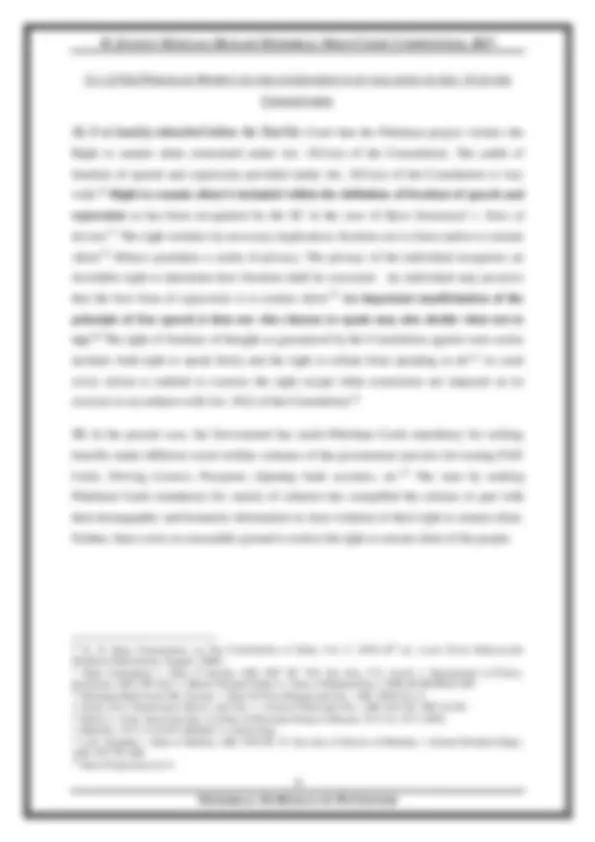
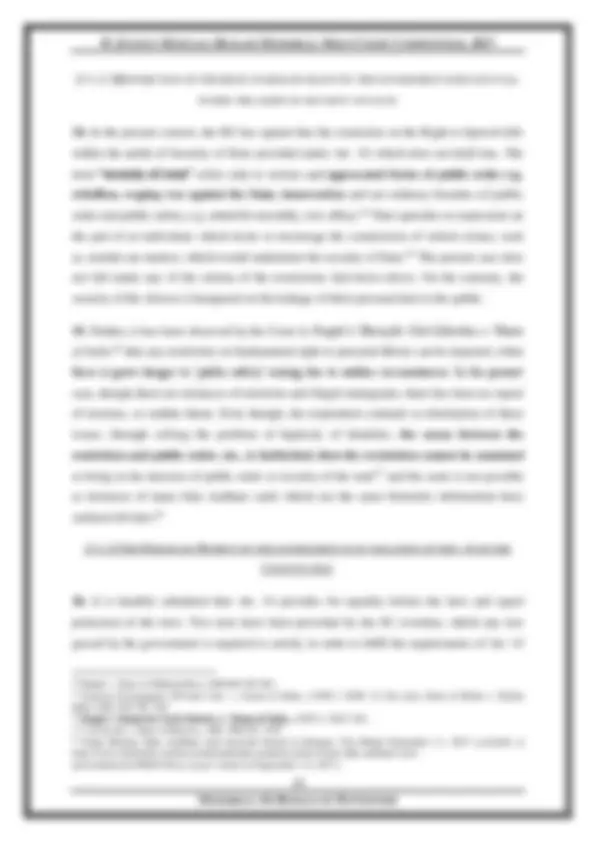
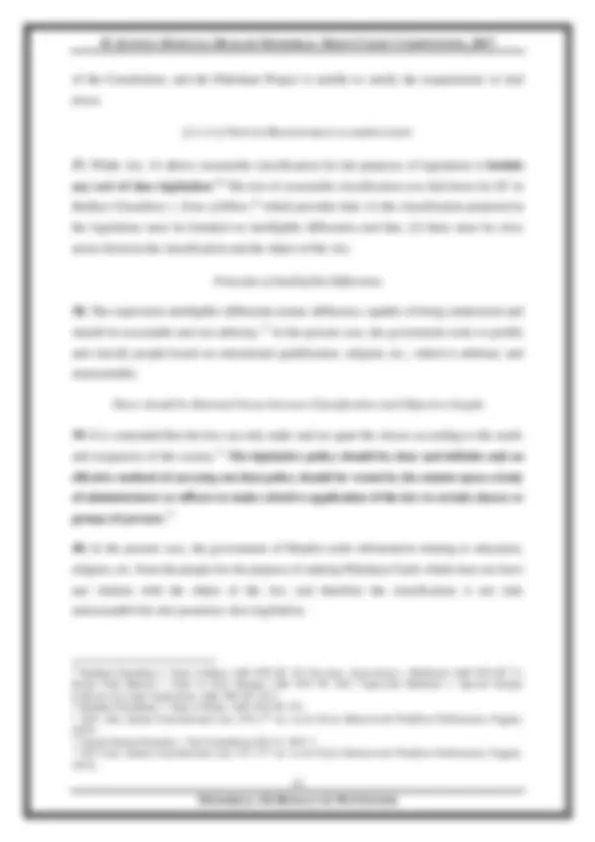
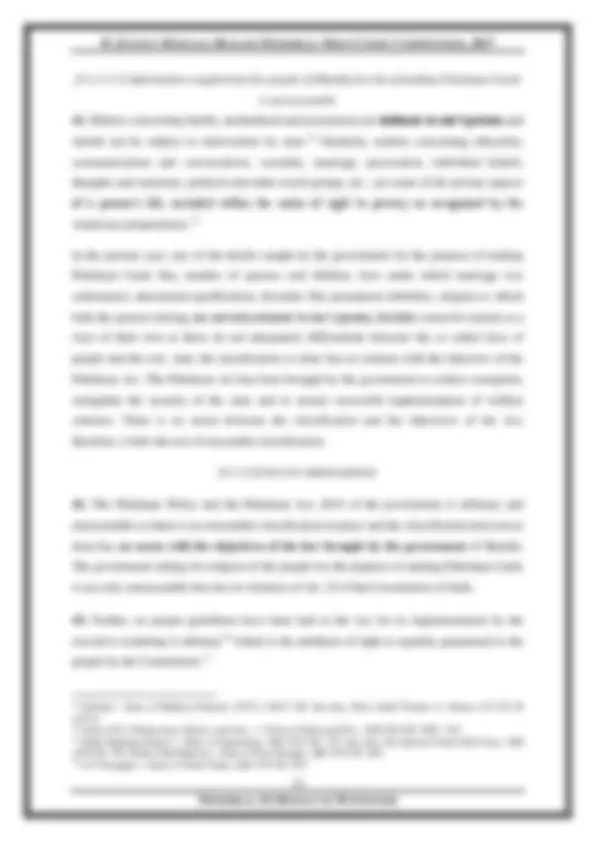
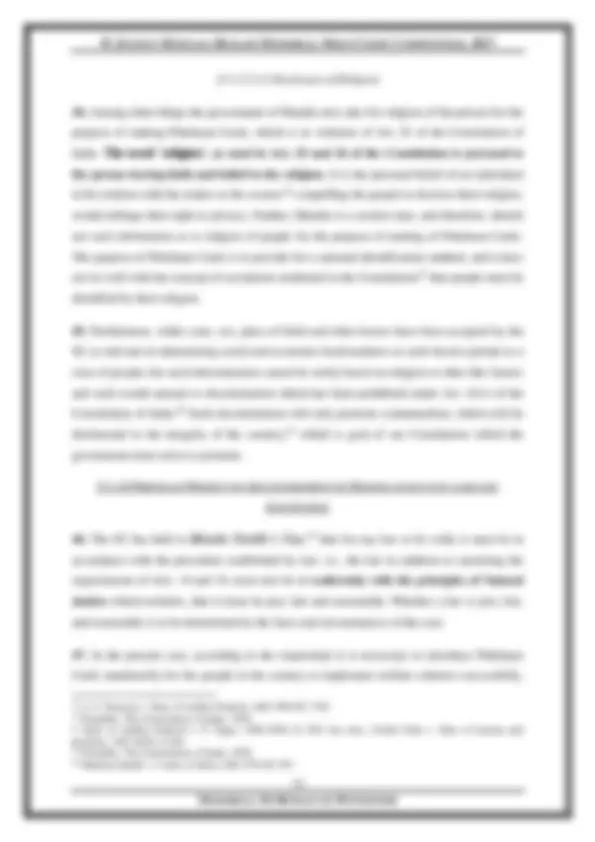
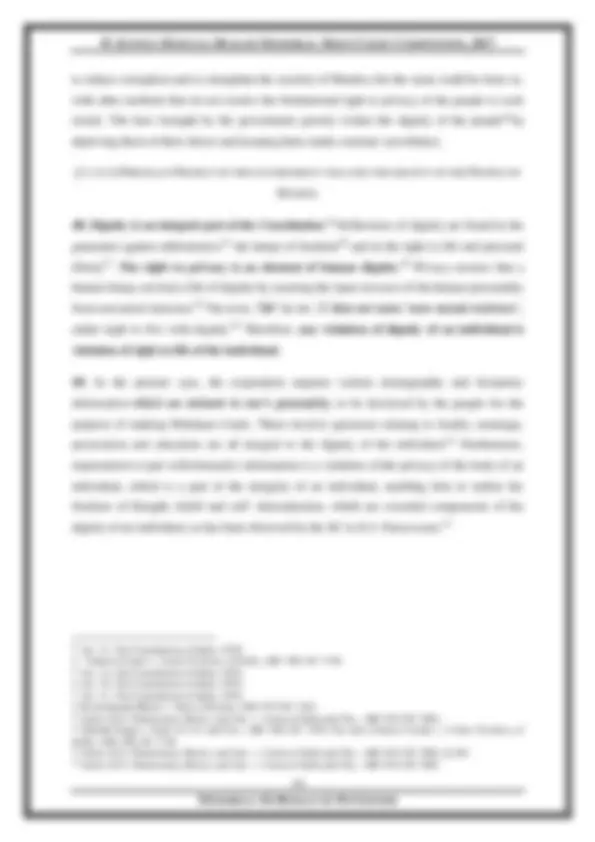
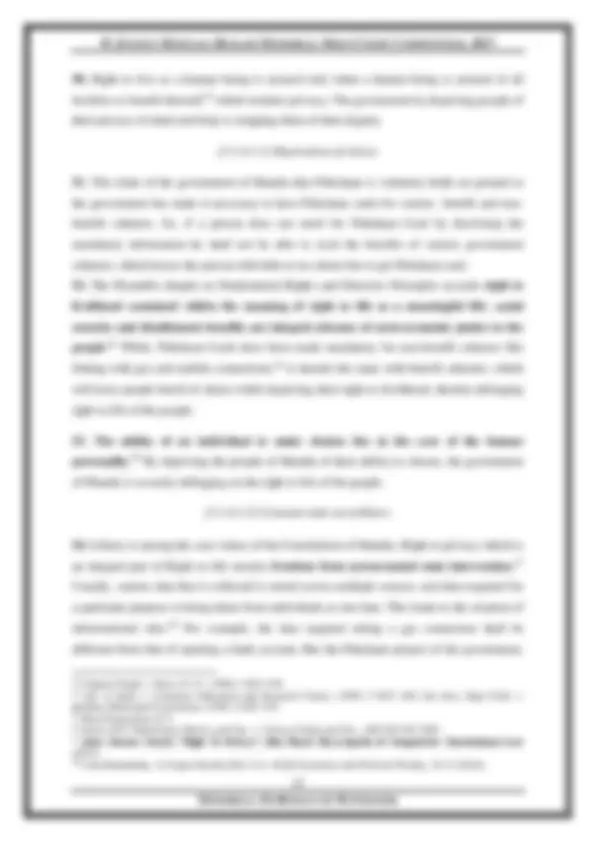
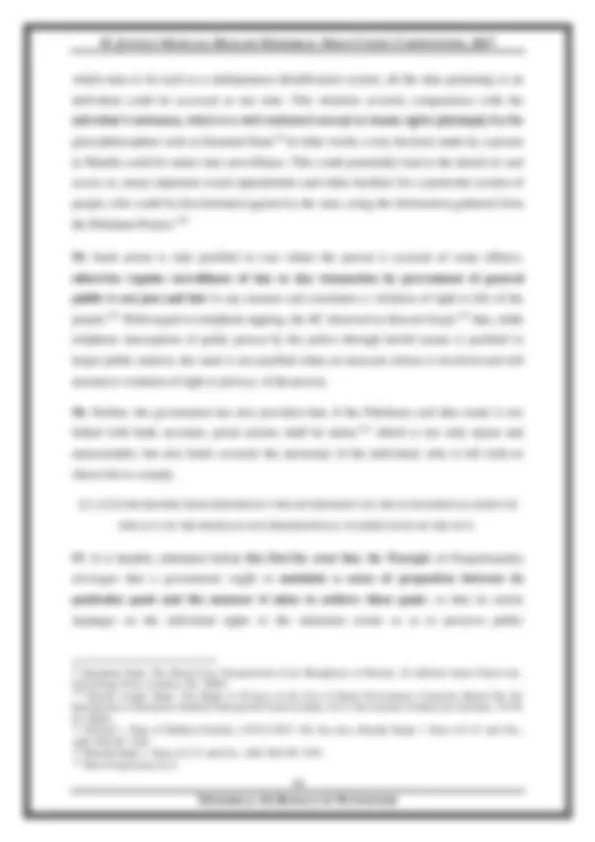
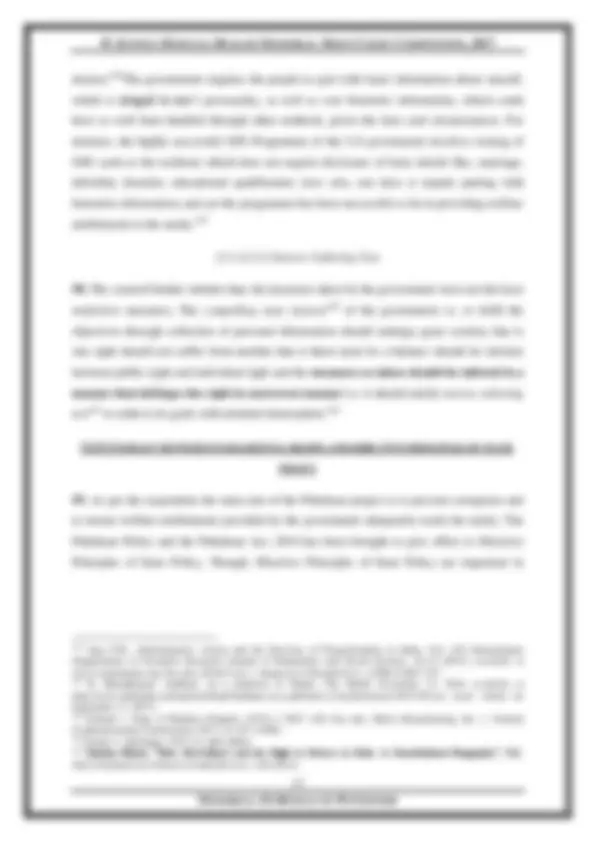
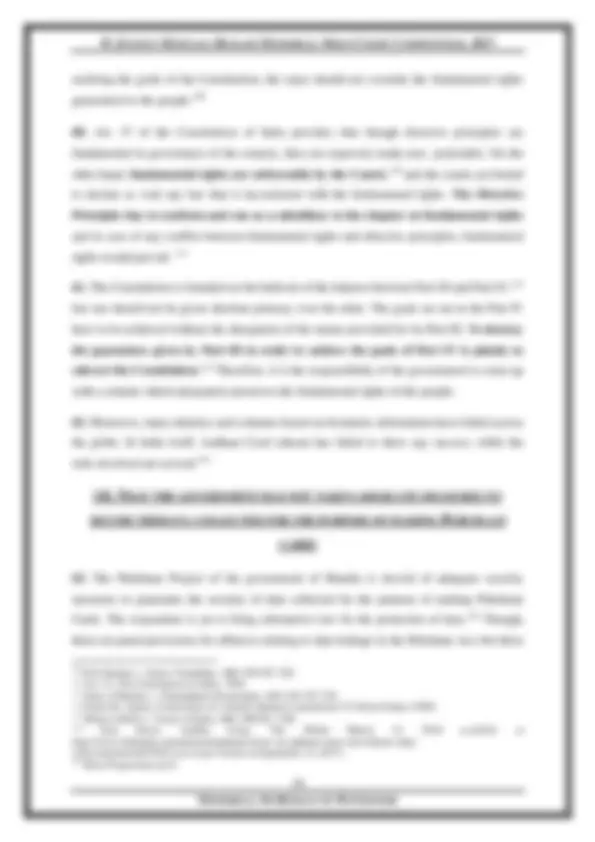
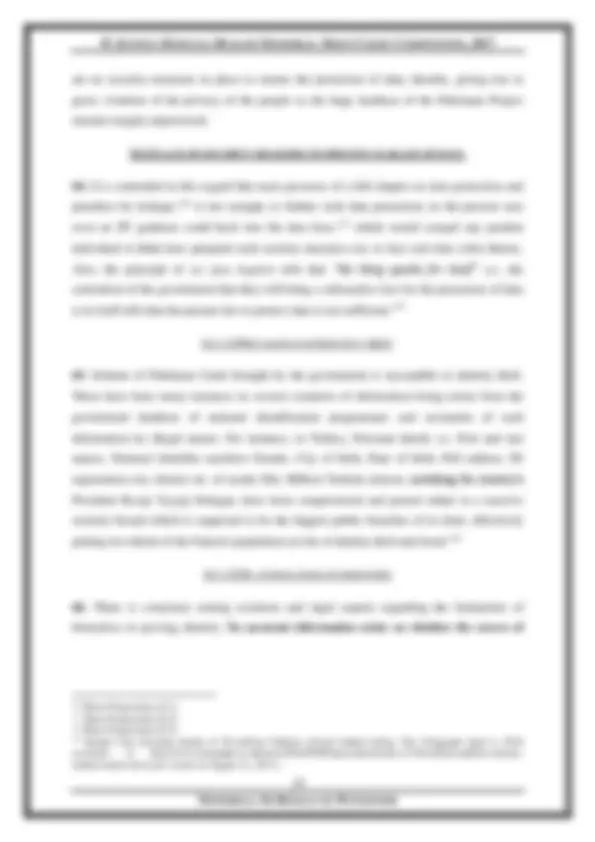
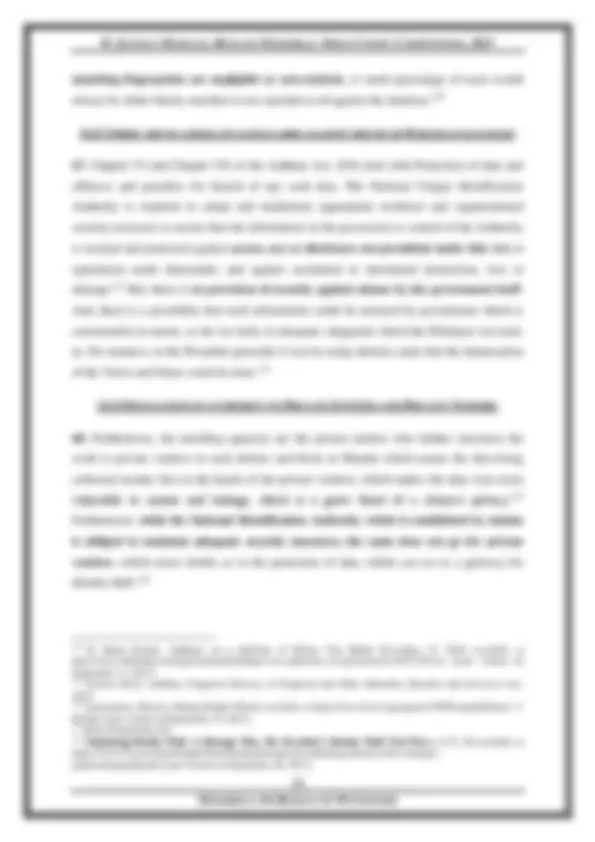
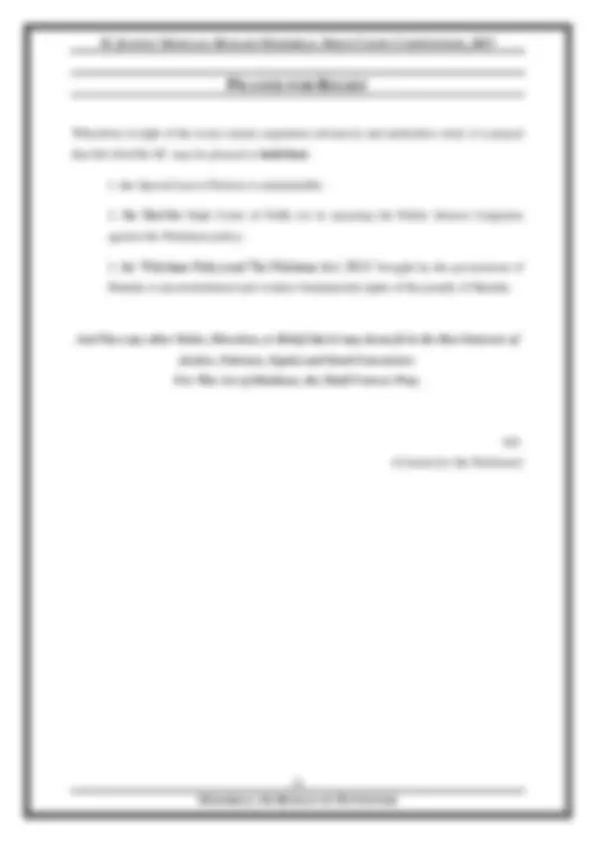


Study with the several resources on Docsity

Earn points by helping other students or get them with a premium plan


Prepare for your exams
Study with the several resources on Docsity

Earn points to download
Earn points by helping other students or get them with a premium plan
Community
Ask the community for help and clear up your study doubts
Discover the best universities in your country according to Docsity users
Free resources
Download our free guides on studying techniques, anxiety management strategies, and thesis advice from Docsity tutors
Moot court preposition memorial for adhar case
Typology: Papers
1 / 35

This page cannot be seen from the preview
Don't miss anything!




























List of Abbreviations .............................................................................................................. iv
Index of Authorities ................................................................................................................. v
Statement of Jurisdiction ....................................................................................................... ix
Statement of Facts .................................................................................................................... x
Issues Presented .....................................................................................................................xii
Summary of Arguments ...................................................................................................... xiii
Arguments Advanced .............................................................................................................. 1
[1]. That the Special Leave Petition is mainatainable ............................................................ 1 [1.1]. The matter involves Question of Law of General Public Importance...................... 1 [1.2] The matter involves Substantial Question of Law and Gross Injustice has been done .................................................................................................................................... 2 [1.2.1] Substantial Question of Law is involved............................................................ 2 [1.2.2] Gross Injustice has been done ............................................................................ 3 [1.2.3] Finding of Facts may give rise to Substantial Question of Law. ....................... 3 [2]. That the Pehchaan Policy and the Pehchaan Act, 2014 brought by the Government are not Constitutional ................................................................................... 4 [2.1] The Act was brought by the Legislature of the State ................................................ 4 [2.2] The Pehchaan Policy and the Pehchaan Act, 2014 brought by the Government violate the Fundamental Rights of the People ................................................................... 4 [3]. That the Pehchaan Project of the Government is violative of the Fundamental Rights of the People provided by the Constitution ........................................................... 5 [3.1] Violation of the Fundamental Right to Privacy of the People ................................. 5 [3.2] Mandia’s Commitment under International Law ...................................................... 6 [3.1.1] Pehchaan Project of the Government is not in accordance with the ‘Procedure Established by Law’ as per Art. 21 of the Constitution ................................................. 8 [3.1.2] The Pehchaan Project of the Government is in violation of Art. 19 of the Constitution .................................................................................................................... 9
¶ : Paragraph
AIR : All India Report
All : Allahabad
AP : Andhra Pradesh
Art. : Article
Bom : Bombay
Cal : Calcutta
Del : Delhi
DPSP : Directive Principles of State Policy
HC : High Court
IT Act : Information Technology Act
Kar : Karnataka
PIL : Public Interest Litigation
PDS : Public Distribution System
SC : Supreme Court
SCC : Supreme Court Cases
SLP : Special Leave Petition
u/s : Under Section
UOI : Union of India
US : United States
UK : United Kingdom
Art. 136, Const. of India. Const. of Mandia………………………………………………………………………...passim
STATUTES
The Republic of Mandia has a democratic parliamentary form of government with a federal structure based on principles of free and fair elections, equality, liberty, fraternity, transparency, accountability of state, freedom of religion, independent and autonomous judiciary and election commission, inter alia as its core values. The Constitution of Mandia also provides for an independent judiciary.
INTRODUCTION OF PEHCHAAN POLICY
The government of Mandia formulated ‘Pehchaan Policy’ for profiling of its citizens for making of Pehchaan cards. This policy aimed at saving duplicity of identities, identifying illegal immigrants, checking the leakage in the government schemes and preventing corruption happening in PDS and other subsidy providing schemes of the government.
PRIVATE BODIES AND REQUIREMENTS FOR MAKING OF PEHCHAAN CARDS
National Unique Identification Authority was constituted on 30th^ November, 2009 which assigned the task of making Pehchaan cards to private entities who further outsourced the task to private vendors. For this purpose, they took citizen’s details like finger prints of both hands, scanning of iris, blood group, spouse and children details, educational qualification, number of spouses and their religion, details of life-threatening diseases like AIDS, cancer, hepatitis-B, permanent infertility, criminal/civil cases pending and government loan or any other liability.
PIL FILED BY MR. SATISH DHANKAR
Petitioner, Mr. Satish Dhankar, challenged the policy of mandatory Pechaan cards in the HC of Nelhi on 22nd^ January, 2009 through PIL contending Pehchaan policy violates right to privacy and right to speech and expression; especially the right to remain silent and not to part with intimate information about oneself. He contended making it mandatory to provide information that is very intimate and integral to one’s personality is unconstitutional and violative of fundamental rights. Meanwhile, the govt. made Pehchaan card compulsory for seeking benefits under social welfare schemes. Subsequently, on clarification of interim order
passed by HC, issued on petitioner’s plea, the govt. could make it mandatory only for non- benefit schemes.
AMENDMENT OF PETITION
On 11th^ August, 2014, the govt. enacted the Pehchaan Act, 2014 which made Pehchaan cards mandatory for all benefit and non-benefit schemes, and it gave statutory basis to the National Unique Identification Authority. This Act provided for data protection and penalties and punishments for data leakages. The petitioner, thereby requested for amendment of Petition to challenge the Pehchaan Act, 2014 as well, which was accepted by HC. Subsequently, the petitioner contended that data collected by the govt. is not safe and it can be leaked to private entities threatening life and liberty of people. He also claimed that this data could be used by private companies for telemarketing or by majoritarian governments for communal profiling of the communities and also, that the database has already been hacked by an IIT graduate. The respondents responded to this by arguing that there is no right to privacy provided in any provision of Constitution of Mandia and promised to bring soon a substantive law for data protection.
REJECTION OF PIL BY HC
The HC rejected the PIL after hearing the matter in detail and held that Pehchaan Act, 2014 is constitutional and Pehchaan cards can be made mandatory. It further held that the right to deny information to the govt. cannot be held to be fundamental right in the light of necessity to protect the state from terrorism and other security related problems.
SLP FILED BY PETITIONER IN SC
The petitioner has approached the SC of Mandia through a Special Leave Petition and has prayed for quashing the judgment of Hon’ble HC of Nelhi and to declare the Pehchaan Act, 2014 and the whole Pehchaan project of the govt. of Mandia to be unconstitutional.
It is humbly submitted before the Hon’ble SC that, the Special Leave Petition filed by the petitioner, Mr. Satish Dhankar is maintainable, as the matter involves a substantial question of law of general public importance. The arbitrary and hasty judgment of the HC declaring, right to privacy as a common law right and the Pehchaan Policy and the Pehchaan Act, 2014 of the government as Constitutional has resulted in miscarriage of justice and if the SC does not intervene, it will result in gross injustice. The Hon’ble SC should therefore, applying its wide jurisdiction conferred under Art. 136 of the Constitution of India, use corrective measures to correct the wrong done by the decision of the HC of Nelhi.
[2]. WHETHER THE PEHCHAAN POLICY AND THE PEHCHAAN ACT, 2014 BROUGHT BY THE GOVERNMENT OF MANDIA ARE CONSTITUTIONAL?
It is humbly submitted before the Hon’ble SC that the Pehchaan Policy and the Pehchaan Act, 2014 brought by the government of Mandia are unconstitutional as they are in violation of fundamental rights guaranteed under Part III of the Constitution of India. Therefore, even though the Policy and the Act have been brought by the legislature, which comes under the definition of state as per Art. 12 of the Constitution of India, they are in contravention of Art. 13(2) of the Constitution, thus making them void.
[3]. WHETHER THE PEHCHAAN PROJECT OF THE GOVERNMENT IS VIOLATIVE OF THE FUNDAMENTAL RIGHTS OF THE PEOPLE PROVIDED BY THE CONSTITUTION?
It is humbly submitted by the Appellant that Right to Privacy has been accepted by the SC in the case of K.S. Puttaswamy , as a constitutionally protected fundamental right. It is an integral part of Right to life and Personal liberty, and any restriction imposed on it should be in accordance with procedure established by law, i.e., it must satisfy the requirements of Art. 14 and 19. Also, the law imposing such restrictions should be just, fair and reasonable. As per the facts and circumstances of the case, the restrictions imposed by the government on the exercise of right to privacy of people, is arbitrary and unreasonable, as there exists no reasonable classification, and there is no nexus between such classification and the objective of the Act. Information sought from the people, severely violates the bodily and mental integrity of the people, in addition to having no relation to the objective of the Act. Also, classification based on religion is not only discriminatory but compelling the people to
disclose their religion is in violation of Art. 25 of the Constitution of India, 1950. It is also pertinent to note that the restrictions imposed are not in proportion to the objective of the Act. Further, making Pehchaan Cards mandatory for the purposes of benefit and non- benefit schemes deprives the people of their choice; while putting them under constant surveillance of the state. This is a grave violation of right to life as it infringes upon the dignity of the individual, which is the basic element of the Constitution.
Also, it is humbly submitted before the Hon’ble Court that, the Right to remain silent is contained within the meaning of Freedom of Speech and Expression, and can only be restricted in accordance with the explicit provisions provided under Art. 19(2) of the Constitution of India. Further, no law can be made to give effect to Directive Principles of State Policy, which gives absolute primacy to the principles, infringing the fundamental rights of the people.
[4]. WHETHER THE GOVERNMENT HAS TAKEN ADEQUATE MEASURES TO SECURE THE DATA COLLECTED FOR THE PURPOSE OF MAKING PEHCHAAN CARDS?
It is humbly submitted before the Hon’ble Court that the government has not taken adequate measures to secure the data collected under the Pehchaan Project. While, penalties have been imposed for breach of data protection and leakage of data, there is lack of adequate measures at the preventive stage itself, which makes it susceptible to identity theft and other like offences. Further, the National Identification Authority established by the government has delegated the task of data collection to private entities who have further outsourced the task to private vendors, on whom binding rules as to maintaining adequate safety measures do not apply.
4. In the instant matter, the right to privacy, which is an integral part of the right to life of people,^8 is violated by the state and their personal sensitive information has leaked,^9 which is a matter of general public importance and therefore, calls for intervention by the SC.
[1.2] THE MATTER INVOLVES SUBSTANTIAL QUESTION OF LAW AND GROSS INJUSTICE HAS BEEN DONE
5. It is humbly submitted by the petitioner before this Hon’ble Court that, the matter involves substantial question of law as it concerns the violation of fundamental right of privacy of the people of Mandia and gross injustice has already been meted out by the decision of HC of Nelhi, which has hastily and arbitrarily declared it as a common law right, and held the Pehchaan Policy and the Pehchaan Act, 2014 brought by the government of Mandia as constitutional.
[1.2.1] SUBSTANTIAL QUESTION OF LAW IS INVOLVED
6. It is humbly submitted that where findings are entered without considering relevant materials and without following proper legal procedure, interference of SC is called for.^10 In the instant case, the Hon’ble HC has erred in deciding a very substantial question of law, related to right to life of the people. 7. Whether a matter involves substantial question of law, depends on whether it is of general public importance, which directly or substantially affects the rights of the parties, or it has already been decided by the highest Court.^11 It will, therefore, depend on the facts and circumstance of each case whether a substantial question of law is involved in the case.^12 8. It is submitted that, the present case involves a matter of general public importance as it directly and substantially affects the rights of the parties as the order is erroneous and prejudicial to the interest of people and also the HC had erred in dismissing the PIL stating that Right to privacy is not a fundamental right of citizen under Art. 21.
(^8) Justice K.S. Puttaswamy (Retd.), and Anr. v. Union of India and Ors, AIR 2015 SC 3081. (^9) Moot Proposition, ¶ 24. (^10) Dale & Carrington Invt. Ltd. v. P.K. Prathapan, (2005) 1 SCC 212. (^11) Sir Chunilal Mehta and Sons, Ltd. v. Century Spinning and Manufacturing Co. Ltd., AIR 1962 SC 1314. (^12) Sumati Dayal v. CIT, (1995) 214 ITR 801.
9. The judgment of HC of Nelhi is bad in the eyes of law as it did not recognize the right to privacy of people which is an intrinsic part of right to life as fundamental right rather as a common law right.^13 Grave miscarriage of justice has occurred because of this serious and flagrant violation of law has been committed by the HC^14 for which interference of the SC is required. 10. The requirement of personal details for making of Pehchaan Cards, like finger print, iris scan, motherhood, procreation and other like information constitute grave violation of right to privacy of the people, and grave injustice has been meted out by the judgment of the HC by declaring the Pehchaan Act which makes Pehchaan Cards mandatory, as constitutional.
[1.2.3] FINDING OF FACTS MAY GIVE RISE TO SUBSTANTIAL QUESTION OF LAW.
11. The SC is not precluded from going into the question of facts under Art. 136, if it considers it necessary to do so.^15 Art. 136 uses the words ‘in any cause or matter’. This gives widest power to this court to deal with any cause or matter.^16 It is plain that when the SC reaches the conclusion that a person has been dealt with arbitrarily or that a court or tribunal has not given a fair deal to a litigant, then no technical hurdles of any kind like the finality of finding of facts, or otherwise can stand in the way of the exercise of this power.^17 12. In the instant case, the HC, in haste, reached the conclusion that right to deny information to the government cannot be held to be fundamental right as a matter of national security is involved,^18 and that the Pehchaan would be beneficial in making further beneficial government schemes. Thus, on the above grounds, it is humbly submitted that the petition is maintainable before the Hon’ble SC of Mandia.
(^13) Justice K.S. Puttaswamy (Retd.), and Anr. v. Union of India and Ors, AIR 2015 SC 3081. (^14) Ram Piari v. Bhagwant, AIR 1990 SC 1742. (^15) Kathi Ranning Rawat v. The State of Saurashtra, AIR 1952 SC 123, See also, Achyut Adhicary v. West Bengal, AIR 1963 SC 1039. 16 17 Pritam Singh v. The State, AIR 1950 SC 169. Sripur Paper Mills v. Comm. of Wealth Tax, AIR 1970 SC 1520; See also, Om Prakash Sood v. Union of India, Civil Appeal No. 9169 of 1996 18 Moot Proposition, ¶ 24.
takes away or abridges rights conferred by Part III of the Constitution.^25 If the state makes such a law then, it would be ‘still born law’ and void to the extent of such contravention.^26
17. Though post-constitutional laws inconsistent with fundamental rights are void from their very inception yet a declaration by the court of their validity will be necessary.^27 Therefore, the Pehchaan Act, 2014 enacted by the government of Mandia is void, and a declaration of the same by the SC is necessary.
THE FUNDAMENTAL RIGHTS OF THE PEOPLE PROVIDED BY THE CONSTITUTION
18. It is humbly submitted before this Hon’ble Court that the Right to Privacy has been recognized as a fundamental right and the ‘Pehchaan Policy and the Pehchaan Act, 2014’ brought by the respondent is in violation of Arts. 14, 19, 21 and 25 of the Constitution of India.
[3.1] VIOLATION OF THE FUNDAMENTAL RIGHT TO PRIVACY OF THE PEOPLE
19. It is humbly submitted before the Hon’ble Court that right to Privacy is the basic inalienable right of an individual^28 concomitant of his right to exercise control over his personality and is essential for his development as a human being. The liberty of an individual is a matter of fundamental natural law, a private preserve and must be safeguarded from unnecessary interference.^29 20. Right to privacy has been held to be constitutionally protected fundamental right.^30 Right to privacy is vested within right to life and personal liberty under Art. 21 of Constitution of Mandia.^31 A citizen under this right has the right to protect and safeguard the liberty of his own, his family, marriage, procreation, motherhood, childbearing and education among other matters.^32
(^25) Art. 13(2), The Constitution of India, 1950. (^26) Deep Chand v. State of U.P., AIR 1959 SC 648. (^27) Md. Ishaq v. State, AIR 1961 All 532. (^28) Justice K.S. Puttaswamy (Retd.), and Anr. v. Union of India and Ors., AIR 2015 SC 3081. (^29) Gobind v. State of Madhya Pradesh and Ors., (1975) 2 SCC 148. (^30) Gobind v. State of Madhya Pradesh and Ors., (1975) 2 SCC 148; See also, R. Rajagopal v. State of Tamil Nadu, (1994) 6 SCC 632; People’s Union for Civil Liberties v. Union of India, (1997) 1 SCC 301; Kharak Singh v. State of UP, AIR 1963 SC 1295; Ramlila Maidan Incident v. Home Secretary, Union of India, (2012) 5 SCC 1, 119-120 , ¶ 312. 31 Kharak Singh v. State of UP, AIR 1963 SC 1295; See also, Gobind v. State of Madhya Pradesh, AIR 1975 SC 1378; PUCL v. Union of India, AIR 1991 SC 207. 32 Unni Krishnan v. State of A.P. (1964) 1 SCR 332.
According to Black’s Law Dictionary, Privacy has been defined as, “right to be left alone”^33 ; right of a person to be free from any unwarranted publicity; right to live freely from any unwarranted interference by the public in matter with which public is not necessarily concerned”. It is on the desire of people to choose freely under what circumstances and to what extent they will expose themselves, their attitude and their behaviour to others.^34
21. The scope of Art. 21 is very broad and it covers every aspect of life which is required for an individual to live a healthy and secured life. Art. 21 takes all those aspects of life which go to make a person's life meaningful and even State can’t violate it.^35 Art. 21 protects the dignity of human life, one's personal autonomy, one’s right to privacy , etc. Right to dignity has been recognised to be an essential part of the right to life and accrues to all persons on account of being humans. If we talk of right to privacy then it also contains a broad scope in it like tapping of telephonic conversation, disclosure of dreadful disease^36 , subjecting to medical tests.^37 Here in the present case, the information sought under Pehchaan Scheme is very intimate and integral to one’s personality and hence making it mandatory to provide basic and intimate information^38 is unconstitutional and violative of Fundamental Right to privacy.
[3.2] MANDIA’S COMMITMENT UNDER INTERNATIONAL LAW
22. The recognition of privacy as a fundamental constitutional value is a part of Mandia’s commitment to a global human rights regime. The state is required to endeavour to “foster respect for international law and treaty obligations in the dealings of organized peoples with one another”.^39 23. The Universal Declaration of Human Rights of which India is a party recognises that everyone has the protection of law against interference with his privacy , family, home or correspondence, or attack upon his honour and reputation.^40 Similarly, the International Covenant on Civil and Political Rights casts an obligation on states to respect, protect and fulfil its norms. Art. 17 of the ICCPR casts a duty upon the states to adopt and enact measures to prohibit undue interferences with the exercise of right to privacy of people. The
(^33) Rajgopal v. State of Tamil Nadu, 1994 6 SCC 632; See also, Warren and Brandeis, “The Right to Privacy”, Vol.4 (5), Harvard Law Review, 195-196 (1890). 34 Alan Westin, Privacy and Freedom (1967) in Justice K.S. Puttaswamy (Retd.), and Anr. v. Union of India and Ors., AIR 2015 SC 3081. 35 36 Justice K.S. Puttaswamy (Retd.), and Anr. v. Union of India and Ors., AIR 2015 SC 3081. 37 Mr. X v. Hospital Z, AIR (1995) SC 95. 38 Sharda v. Dharmpal, AIR (2003) SC 3450. 39 Moot Proposition, ¶ 7. 40 Art. 51(C), The Constitution of India, 1950. Art. 12, Universal Declaration of Human Rights, 1947 (Adopted on December 10, 1948).